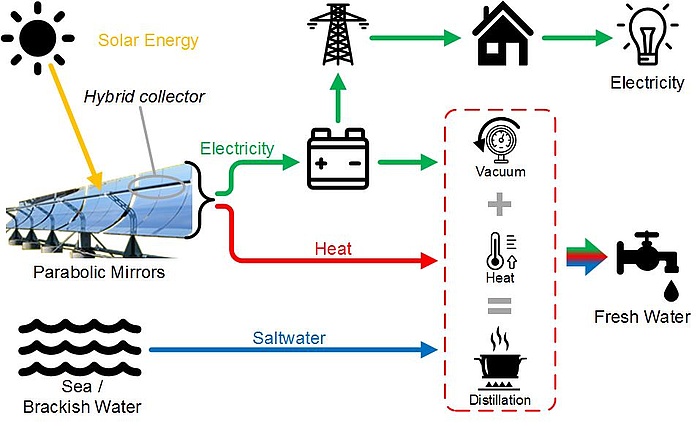NEWSUN – Drinking water for the world

Sustainable production of clean drinking water
In the framework of NEWSUN, the researchers are pursuing the goal of operating a water desalination system – at a very high efficiency of 70% – using 100% solar energy. In addition to its high efficiency, the system also works completely self-sufficiently and is therefore particularly suitable for solutions on islands. To supply the necessary power for the desalination plant, the research team combines two technologies: one that transforms sunlight into heat and one that transforms it into electricity. The plant uses both of them to boil the salt water in a multiple-effect distillation in order to produce steam. The steam condenses inside the plant as pure water, is collected and can be used as drinking water.
Optimisation need for long service life
Armin Buchroithner sees one of the challenges facing the NEWSUN project to be cooling the electricity-producing concentrator photovoltaic cells. ‘Systems in which the production of heat and electricity from solar energy are combined – so-called hybrid absorbers – are subject to a conflict of goals since heat is usually needed at high temperatures and this damages the PV modules. In the NEWSUN hybrid absorber, an optimal compromise between thermal and electrical yield must be obtained,’ the scientist explains, summarising the dilemma. ‘We place special attention on dimensioning the cooling and fixing an operating temperature which is optimal for the process to ensure a high service life of the parts.’ To this end in the framework of the project the researchers are creating a computer simulation of the complete system and setting up a scaled prototype in a laboratory environment. The system components can be optimised using numerical models which are validated by means of back-flowing measuring data. In addition to the great potential that the NEWSUN technology promises for global drinking water production, it is also a possible application for obtaining extremely pure water that could be used in the production of medicines, in analytic chemistry and microelectronics.This research project is attributed to the Field of Expertise „<link https: www.tugraz.at en tu-graz services news-stories planet-research foe-sustainable-systems _blank int-link-external external link in new>Sustainable Systems“ one of TU Graz' five strategic areas of research.
Visit <link https: www.tugraz.at en tu-graz services news-stories planet-research all-articles _blank int-link-external external link in new>Planet research or more research related news.
Kontakt
Ph.D., MSc.
<link https: www.tugraz.at en institutes emt home _blank int-link-external external link in new>Institute of Electrical Measurement and
Measurement Signal Processing (EMT) TU Graz
Inffeldgasse 23/II, 8010 Graz
Phone: +43 (0) 316-873-30514
<link int-link-mail window for sending>armin.buchroithner@tugraz.at



